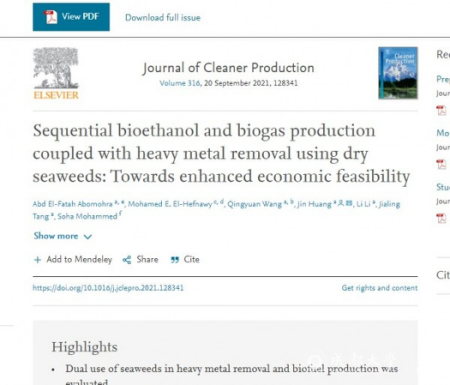Recently, the distinguished high-end foreign expert at Chengdu University, Professor Abomohra (Ma Wenbiao), has published three journal articles as the first author in world-renowned engineering journals, with Chengdu University as the first affiliation. The paper entitled "Microwave vacuum co-pyrolysis of waste plastic and seaweeds for enhanced crude bio-oil recovery: Experimental and feasibility study towards industrialization" was published in Renewable & Sustainable Energy Reviews (SCI Grade 1 by the Chinese Academy of Sciences, IF: 14.982). The paper entitled "Enhancement of biodiesel yield and characteristics through in-situ solvo-thermal co-transesterification of wet microalgae with spent coffee grounds" was published in Bioresource Technology (SCI Grade 1 by CAS, IF: 9.642). The paper entitled "Sequential bioethanol and biogas production coupled with heavy metal removal using dry seaweeds: Towards enhanced economic feasibility" was published in Journal of Cleaner Production (SCI Grade 1 by CAS, IF: 9.297).

The studies focus mostly on the combinations of microalgae and seaweeds with wastes such as the waste plastic and the spent coffee ground. They present systematic discussions respectively on the generation of crude bio-oil utilizing the interaction between the low-density polyethylene (LDPE) and the seaweeds under microwave vacuum pyrolysis, the production of biodiesel through the interaction of the microalgae with the spent coffee ground, and the dual use of dry seaweeds in heavy metal removal and biofuel (biogas and bioethanol) production. As shown by the study, the rich biomass generated by seaweeds during their growth in marine environment could be used for both heavy metal removal and bioethanol/biomethane production. All three studies exert significant impacts on the recycling of the municipal waste.
Professor Abomohra (Ma Wenbiao), head of the New Energy and Environment Laboratory (NEEL) of Chengdu University, is engaged in the interdisciplinary research of microbiology and environmental engineering. His team is mainly committed to the research and application of algae in sewage treatment, carbon dioxide storage and production of biofuel such as biodiesel, bioethanol, biogas and crude bio-oil.